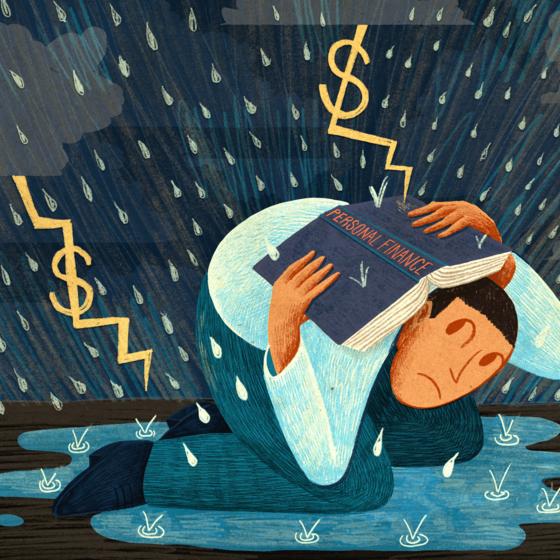A Yale Economist Read 50 Personal Finance Books. He’s Got Some Notes.
Personal finance gurus frequently depart from conventional economic wisdom, Yale SOM’s James Choi discovered, but their advice isn’t all bad.
Three years ago, Yale SOM’s James Choi was putting together the syllabus for a new course on personal finance. It seemed only natural to check out a few popular books on the topic to see if they might contain any useful material.
But when he delved into the bestselling titles, “I was taken aback by how at odds some of the advice was with what we as economists thought was the right thing to do from economic theory,” he says. The experience “planted a seed in my mind: wouldn’t it be interesting to do a systematic survey of what this marketplace of books is telling readers to do?”
For the next several years, and with the help of a small army of undergraduate research assistants, Choi did just that. He selected the 50 most popular personal finance books on Goodreads and, in a new paper, catalogued their advice on issues including mortgages, savings strategy, debt management, and investment allocation.
In some cases, the advice was just plain incorrect. But much of it departed from economic theory in ways that Choi found harder to diagnose as straightforwardly good or bad. In contrast to most economic models, personal finance gurus were intensely focused on how psychological factors such as willpower and motivation play into financial decisions.
For example, many of the books advocated for saving 10 to 15% of your income, regardless of what your income is. Economists, by contrast, would argue for consumption smoothing—that is, keeping spending constant over time and saving more as you make more.
“Economic theory says your savings rate should be low in your 20s and super high in your 40s to make up for the fact that you weren’t saving very much in your 20s,” Choi explains. From this standpoint, not saving much in your post-school years is “perfectly fine, and in fact it’s optimal.”
Still, he sees why personal finance books don’t recommend the strategy. “I think it comes from a different conception of human nature,” Choi says. These authors see saving as a discipline, so the earlier you establish the habit, the better. Developing the willpower to save is “not a problem for the fictional economic agent in our models.”
(Here, Choi notes, economists may be guilty of a “do as I say, not as I do” approach. “A little hobby of mine has been to ask various economics and finance professors, ‘What did you do about savings while you were in your PhD program?’” Most found a way to save, despite their modest incomes. “I certainly did,” Choi admits.)
For popular authors, psychological factors loom equally large in approaching debt. If you’ve got multiple loans competing for your repayment dollars, economists would argue for paying down the highest interest debt first. Surprisingly, 10 of the books Choi read advised against that seemingly inarguable strategy. They suggested paying down the lowest balance loans first—the so-called snowball strategy—not because it’s mathematically sound, but because it gives debt-burdened borrowers a much-needed victory. Choi doesn’t entirely agree, but sees the logic: if you’re feeling overwhelmed, zeroing out an account “might be super motivating.”
In general, many popular finance books took a stance on debt that stands in contrast to economists’ more neutral perspective. “The books almost universally say it is a terrible idea for you to ever be in credit card debt,” Choi says. “Only one of the books, by Suze Orman, said it might be okay for you to have some credit card debt if you’re just starting out in life and you expect your income to be considerably higher in the near future.”
Choi also observed a sharp divergence between economists and popular authors on the topic of mortgages; 11 books characterized adjustable-rate mortgage as riskier than fixed-rate mortgages. That’s not always true, Choi points out. Fixed-rate mortgages are highly sensitive to inflation in ways adjustable-rate mortgages aren’t. “Economic models say that most people should prefer a floating-rate mortgage, unless they’re really stretching their budget to buy the house or if interest rates are super low right now,” he says. “And that’s the opposite of the message that you’re getting from the popular authors.”
In the end, whether the advice popular finance books offer is good or bad, Choi sees it as important to understand. “They reach a ton of people. Millions and millions of people pay good money to read these things,” he says. “And, frankly, these authors are probably more influential than economists are.”
“Maybe we as economists should think about what’s missing from our advice. Maybe there are some things that people really care about that we just aren’t considering in our models.”
The very fact of these authors’ popularity suggests “people find their message to be somewhat compelling,” Choi says. “And so maybe we as economists should think about that and say, hey, what’s missing from our advice? Maybe there are some real constraints that people operate under, or some things that people really care about, that we just aren’t considering in our models.”
It’s clear to Choi that there’s a need for accessible, easy-to-follow, and accurate advice from trustworthy sources. Many people reach their early 20s with little knowledge of how to manage their finance, so turning to popular books for advice is an understandable choice. He thinks universities could help fill the gap—most don’t offer personal finance courses, but when they do, “there’s overwhelming demand.”
And if you’ve followed the wisdom of popular personal finance gurus—particularly the pro-savings, anti-debt contingent—instead of economists, Choi sees no reason to panic. Their guidance may not always be theoretically optimal, but it’s generally not ruinous either. After all, “it’s prudent to live within your means and not borrow on your credit card,” he says. “That’s not at all crazy advice.”
